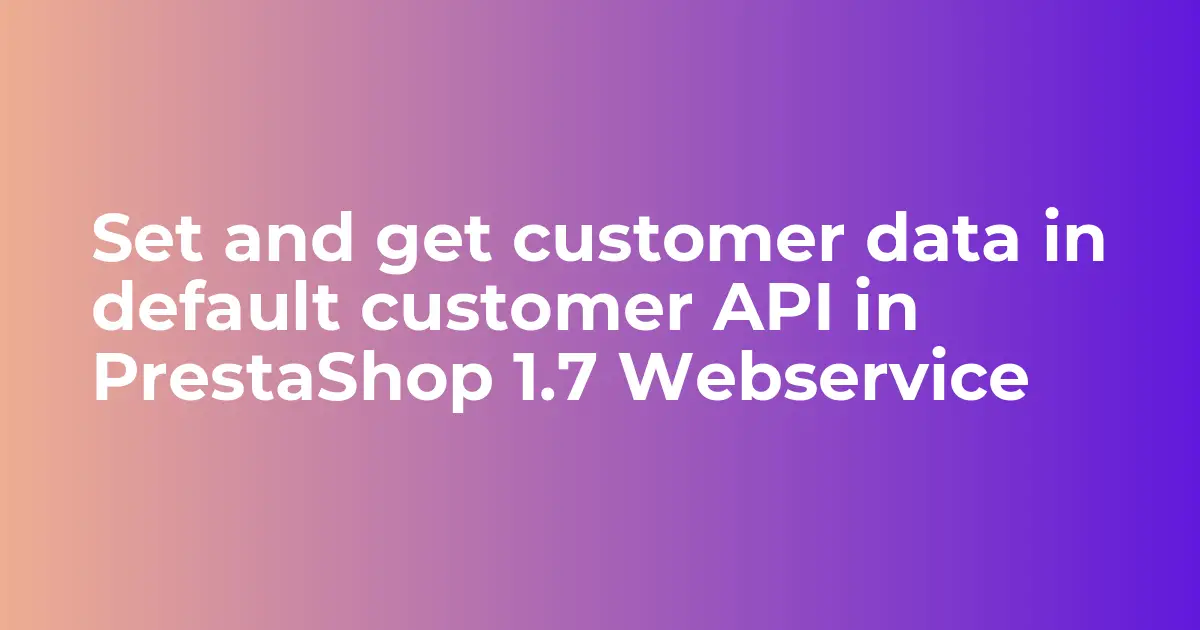In this blog, we are going to learn how to get and set customer data in our module by using the default PrestaShop customer API in the PrestaShop Webservice.
So let’s understand how to achieve it:
Sometimes, we store customer data in our module suppose the username of the customer because PrestaShop does not store usernames.
So we are taking the example of a username in this blog.
We will override the customer.php file in our module and write the code as given below :
protected $webserviceParameters = [
'objectMethods' => [
'add' => 'addWs',
'update' => 'updateWs',
],
'fields' => [
'id_default_group' => ['xlink_resource' => 'groups'],
'id_lang' => ['xlink_resource' => 'languages'],
'newsletter_date_add' => [],
'ip_registration_newsletter' => [],
'last_passwd_gen' => ['setter' => null],
'secure_key' => ['setter' => null],
'deleted' => [],
'passwd' => ['setter' => 'setWsPasswd'],
],
'associations' => [
'groups' => ['resource' => 'group'],
// our module association to get and set username
'username' => [
'resource' => 'username',
'fields' => [
'username' => ['required' => true],
],
],
],
];
In the above code, we have overridden $webserviceParameters variable and added a new association username with resource name and fields. we can define those fields that we want to set and get from the customer API from our module table.
Now we will define the getter function in the override customer.php for username association:
public function getWsUsername()
{
$data = Db::getInstance()->executeS(
'SELECT `username` as user_name FROM ' . _DB_PREFIX_ . 'wk_customer_username WHERE `id_customer` = ' . (int) $this->id
);
return $data;
}
In the above code, we are passing a username from our module table. Now we will call customer API to get customer data: http://{your_domain}/api/customers/{customer_id}/?ws_key={your_api_key}
You will see the customer username in the association node.
Now, we will define the setter function in override customer.php for updating and creating a username:
public function setWsUsername($params)
{
$username = $params['user_name'];
$isExist = Db::getInstance()->getValue(
'SELECT `username` as user_name FROM ' . _DB_PREFIX_ . 'wk_customer_username WHERE `id_customer` = ' . (int) $this->id
);
if ($isExist) {
$sql = 'UPDATE '._DB_PREFIX_.'wk_customer_username SET `username` = ' . pSQL($username) . ' WHERE `id_customer` = ' . (int) $this->id;
if (!Db::getInstance()->execute($sql)) {
WebserviceRequest::getInstance()->setError(
400,
$this->trans(
'Username is not updated',
[],
'Admin.Catalog.Notification'
),
41
);
}
} else {
$sql = 'INSERT INTO '._DB_PREFIX_.'wk_customer_username (`username`, `id_customer`) VALUES ('.pSQL($username).','. (int) $this->id.'';
if (!Db::getInstance()->execute($sql)) {
WebserviceRequest::getInstance()->setError(
400,
$this->trans(
'Username is not saved',
[],
'Admin.Catalog.Notification'
),
41
);
}
}
return true;
}
In the above code, we are setting a username in our module table and passing an error if we found. Now we will call create and update customer API: http://{your_domain}/api/customers/?ws_key={your_api_key}
That’s all about this blog. Hope it will help you.
If you are facing any issues or doubts in the above process, please feel free to contact us in the comment section.
We would be happy to help.
Also, you can explore our PrestaShop Development Services & a large range of quality PrestaShop Modules.
For any doubt contact us at [email protected]
Source link







Leave a Reply